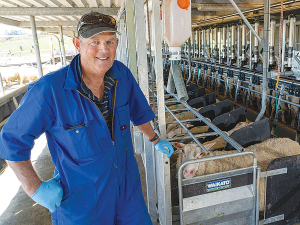Blue River Dairy eyes new markets after China success
Sheep infant nutrition maker Blue River Dairy is hoping to use its success in China as a springboard into other markets in future.
 Paul White says the Agili Rapid Exit milking system has helped the farm move close to its seasonal milk production targets.
Paul White says the Agili Rapid Exit milking system has helped the farm move close to its seasonal milk production targets.
A Waikato family among the first to enter the commercial dairy sheep industry is starting to see the rewards of their hard work as they come to the end of their second season.
Paul and Dianne White set up Green Park Sheep at Kio Kio near Te Awamutu in 2020 for their sons Brad and Kieran to operate.
They began milking 850 sheep on the 81-hectare property through a 40-aside Agili Rapid Exit parlour, which was originally an old inline shed for cows.
Its conversion into a sheep milking plant was designed by Waikato Milking Systems and installed by Qubik.
Green Park Sheep was among the first to supply to Maui Sheep Milk.
"During the first season lamb rearing was very labour intensive and the animals really tested our fences," Paul said.
"So before we started our second season we installed a custom-designed lamb rearing shed which can take up to 1,000 lambs at a time using four auto feeders."
They're now able to take the lambs off their mums after 24 hours, significantly increasing milk production.
The season ends around mid-April and lambing begins in late July.
The dry period will be used to further tweak management plans. That includes upgrading fences with netting to ensure lambs don't escape.
The farm was on track to record another milk production increase.
"We've come close to reaching our production target. We will end up with about 45-46 milk solids per ewe for our second season, for our first season we did about 35.
"As the genetics improve, as we get a younger flock profile, milk production will improve further."
Green Park expected to increase ewe numbers to about 1,200 for its third season.
Paul said the Agili Rapid Exit milking systems would be able to handle the increase in milking ewe numbers.
"At the moment we are milking about 800 ewes in an hour and 20 minutes. In the peak during full production, we're taking about 2.5 to 3 hours to milk 1,000 just because of the high volume of milk.
"When milk volume drops, milking gets a bit faster."
The family is keen to investigate new automation options about to be released by Waikato Milking Systems.
It includes animal ID capability, milk yield recording and automatic sorting for rotary and inline dairy sheep milking systems.
"Ultimately it will provide us with information on how well the ewes are performing and we can use that information to better manage the farm."
Not far away in Cambridge, Allan and Toni Browne say they're also keen to see animal ID technology added to their 70-point Ultimo Internal Sheep Rotary Milking System, which was designed by Waikato Milking Systems and installed in 2020.
"Once we get accurate ID readers, we can also add some milk monitoring features."
The rotary already has electronic cup removers, SmartPulse, In-Bail Feed, SR Cluster Washer and Automatic Headlocks.
Allan and Toni's Browne Pastoral farm milked 1050 ewes at the peak of their first season and 1,420 at the peak of their second season.
Allan said the internal rotary had performed "faultlessly" and helped the farm outperform initial milk production expectations.
Coming in at a year-end total at 3088 units, a rise of around 10% over the 2806 total for 2024, the signs are that the New Zealand farm machinery industry is turning the corner after a difficult couple of years.
New Zealand's animal health industry has a new tool addressing a long-standing sustainability issue.
The Government has announced that ACC will be a sponsor of this year's FMG Young Farmer of the Year competition.
As veterinary student numbers grow to help address New Zealand's national workforce shortge, Massey University's School of Veterinary Science is inviting more veterinary practices to partner in training the next generation of vets.
South Island dairy farmers will soon be able to supply organic milk to Fonterra.
Norwood has announced the opening of a new Tasman dealership at Richmond near Nelson next month.
OPINION: There will be no cows at Europe's largest agricultural show in Paris this year for the first time ever…
OPINION: Canterbury grows most of the country's wheat, barley and oat crops. But persistently low wheat prices, coupled with a…